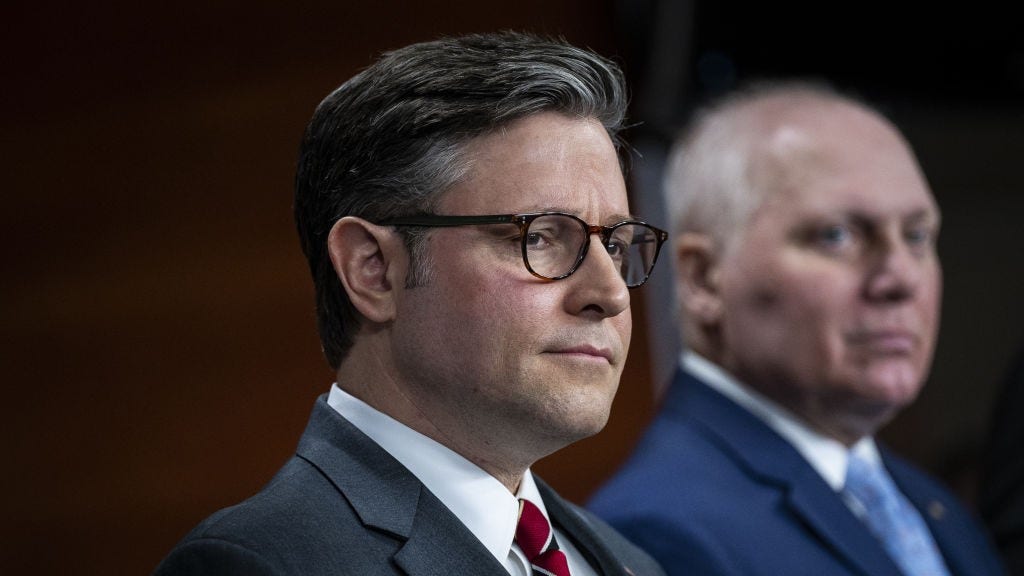The 119th Congress convenes on Friday with the crucial task of electing a Speaker of the House, a constitutional officer essential for the House to function. This seemingly perfunctory process carries significant weight as the House cannot conduct any business—swearing in members, adopting rules, debating bills, or forming committees—until a Speaker is chosen. The recent history of Speaker elections underscores the potential for protracted and turbulent proceedings. The 2023 election of Kevin McCarthy required a grueling 15 ballots over five days, and his subsequent removal led to further chaos with multiple failed attempts to elect a successor, ultimately resulting in Mike Johnson’s election after a series of withdrawals by other candidates.
Speaker Johnson’s leadership has faced considerable criticism from within the Republican party, particularly from conservative factions. His handling of interim spending bills, including aid for Ukraine, a debt ceiling increase, and a large spending package, has alienated some members who view his actions as insufficiently conservative and overly cooperative with Democrats. This internal dissent casts a long shadow over the upcoming Speaker election, creating uncertainty and raising the possibility of a repeat of the drawn-out process witnessed earlier in the year. The narrow Republican majority in the House further amplifies the impact of even a small number of dissenting votes, making the outcome unpredictable.
The procedure for electing the Speaker begins with a roll call to establish the number of members present. Following this, nominations are made, traditionally by the Republican and Democratic conference chairs. In this instance, Rep. Lisa McClain is expected to nominate Johnson, while Rep. Pete Aguilar will likely nominate Minority Leader Hakeem Jeffries. Any member may nominate additional candidates, even individuals outside the House, although this is rare. The House then proceeds to a roll call vote where each member verbally announces their choice for Speaker. To win, a candidate must secure a majority of the votes cast for a specific individual. “Present” votes don’t count toward the total, creating a complex dynamic where a smaller number of votes is needed to reach a majority if several members choose to vote “present” as a form of protest.
The thin Republican majority presents a significant challenge for Johnson. A small number of dissenting votes could prevent him from achieving the required majority. If Republicans choose to vote “present” rather than for another candidate, it could inadvertently hand the Speakership to Jeffries if enough Republicans withhold their support for Johnson. This delicate balance creates a high-stakes scenario where strategic voting and potential alliances become crucial. The possibility of a drawn-out election looms large, with potential consequences extending beyond the House’s internal dynamics.
A protracted Speaker election could delay the certification of the Electoral College vote scheduled for January 6th. The House and Senate must meet in a joint session to complete this crucial step, and the absence of a Speaker would prevent the House from participating. Further complicating matters, a prolonged election could exacerbate existing divisions within the Republican party. Tensions between more moderate members and the staunchly conservative factions, including the Freedom Caucus, are already high, and a contentious Speaker election could further inflame these divisions, jeopardizing the party’s ability to govern effectively and advance its legislative agenda, including implementing President-elect Trump’s priorities.
The upcoming Speaker election serves as a microcosm of the challenges facing the Republican party in the 119th Congress. The narrow majority, combined with internal ideological divisions, creates a volatile environment. The outcome of the Speaker vote will not only determine the House’s leadership but also set the tone for the coming legislative session. A smooth election would suggest a degree of unity and the potential for productive governance. However, a protracted and contentious election could portend further gridlock, infighting, and difficulty in advancing any legislative agenda, potentially impacting the entire nation’s political landscape.

